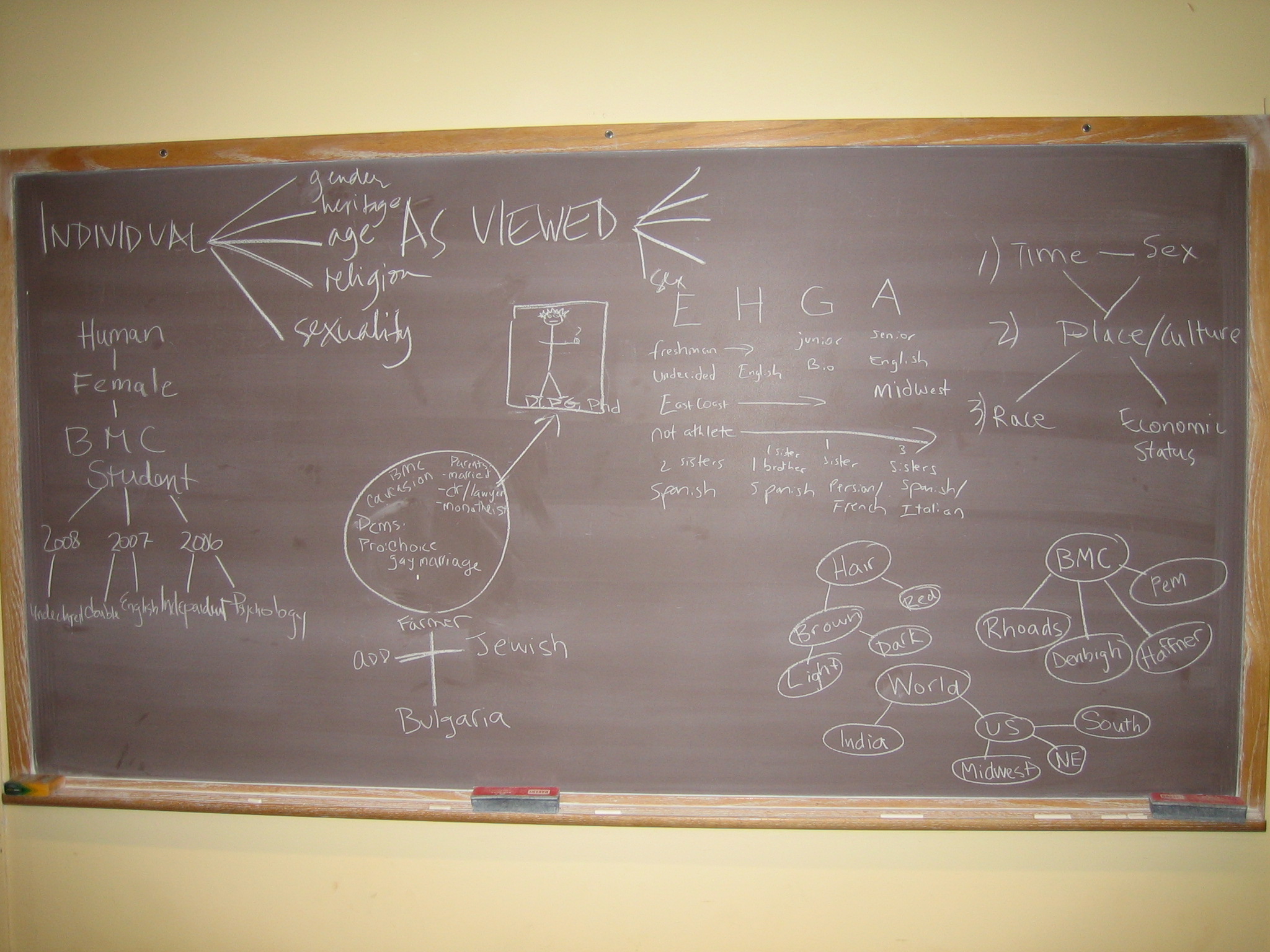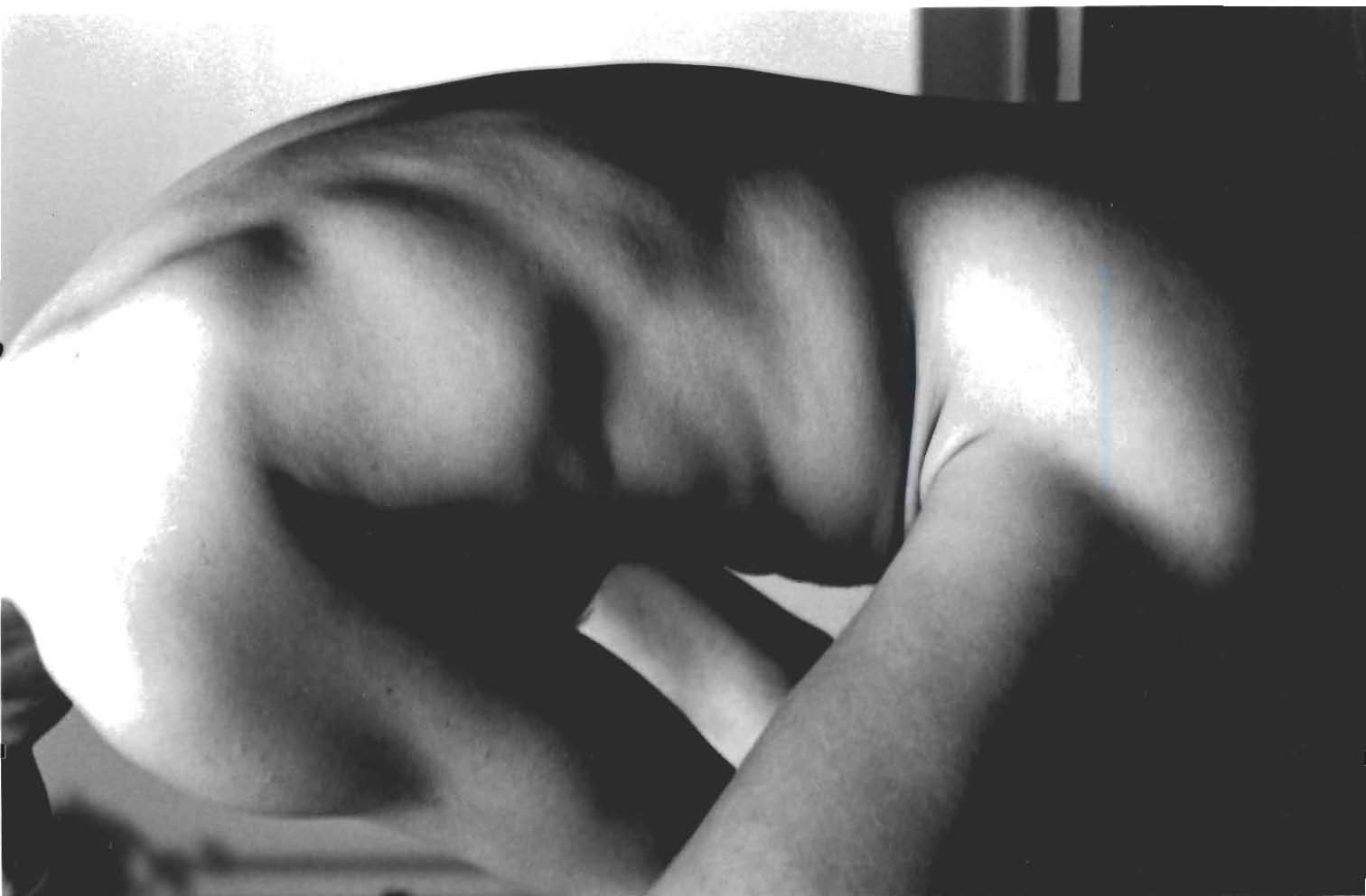Story of Evolution/Evolution of Stories
Bryn Mawr College
April 4, 2005
STILL More on Story Telling "Styles" and Preferences
... Categories?
Gender and Genre:
A Further Exploration of Kinds,
Whence They Arise, Wherefore They Are Useful
(And How They Can Be Misused....?)

What are your reactions?
What have you learned about categories from this film?
Britt:
this whole idea of "male narrations" and "female narrations" (or male/female brains) means very little....Why does our society insist that we lump together such unrelated categories so that we can create an "orderly" world?... humans like categories because it helps them to order other people, but at the same time humans dislike them because it allows them to be ordered around...
Arshiya:
The whole dilemma, drama arises because none of characters in the stories fit into these two categories....What about our story-telling brain prefers two categories rather than a set of infinite possibilities?...the categories are inherently there, and not necessarily created by external social determinants....are categories, taxonomies simply rules and limitations that we impose on our stories because it provides us with more stability ? ...how exactly...?
Multiple examples of category use/abuse, on campus and off, this week, including
Political Diversity: Red, Blue, Purple:
"There are votes, and there are views." Not everybody who votes the same is the same.
the neocortex, which aspires to coherence...tries to fit new input...into existing structures
(hence a propensity, among humans, for nostalgia)."Disabled Contestant Loses Title" (...because she can stand. NYTimes 4/2/05):
"I can't represent the disabled citizens...because I'm not disabled enough."
Japanese-Korean woman "Born to be a Foreigner in Her Motherland" (NYTimes 4/2/05):
"only a few municipalities...have opened management-level positions to non-Japanese...."
Lauren Friedman's (draft of her) senior thesis:
"Linguistic binaries in a Multiplicitous World:
Deconstructing the Duality of Gender in Language and Thought"
- It is powerful who made the names of things into law, and among the powerful it is the greatest artists in abstraction who created the categories.--Friedrich Nietzsche, The Will to Power (1901)
- The choice between two of something is not a choice at all, but rather the opportunity to subscribe to the value system which holds the two presented choices as mutually exclusvie alternatives. Once we choose one or the other, we've bought into the system that perpetuates the binary.--Kate Bornstein, Gender Outlaw: On Men, Women, and the Rest of Us (1994)
- The arroba--used in words like nosotr@s and ostr@s--marks a rejection of the supposedly inclusive Latinos/as "slash" approach, which actually only serves to reinforce the gender binary....a creative linguistic intervention in the highly gendered structure of Spanish....One of the main reasons the binaries collapse in cyberspace is because the body disappears. Juana Rodriguez, Queer Latinadad: Identity Practices, Discursive Spaces (2003)
I want to look particularly today @ the categories of
genre and gender:
Are there essential distinctions to be made between them?
What might be the relationship between them?
genre, n. [F. genre kind: see GENDER.]
1. a. Kind; sort; style.
b. spec. A particular style or category of works of art; esp. a type of literary work characterized by a particular form, style, or purpose.
gender, n. [a. OF. gen(d)re (F. genre) = Sp. and Pg. genero, It. genere, ad. L. gener- stem form of genus race, kind = Gr. , Skr. janas: Aryan *genes-, f. root - to produce; cf. KIN.]
1. Kind, sort, class; also, genus as opposed to species. the general gender: the common sort (of people). Obs.
2. In mod. (esp. feminist) use, a euphemism for the sex of a human being, often intended to emphasize the social and cultural, as opposed to the biological, distinctions between the sexes.
Let's begin (again) by thinking taxonomically.
From Wikipedia:
Mathematically, a taxonomy is a tree structure of classifications for a given set of objects. At the top of this structure is a single classification, the root node, that applies to all objects. Nodes below this root are more specific classifications that apply to subsets of the total set of classified objects....the graph looks a bit like a tree, even though the tree is generally shown upside down compared with a real tree; that is to say with the root at the top and the leaves at the bottom....This specific example happens to be a complete binary tree, which means all nodes have exactly zero or two child nodes.

Where does this figure belong, in such a binary tree?
Generically? Gender-ifically?

Sleeping Hermaphrodite, The Louvre, from ArtServe at the Australian National University
How do our taxonomies differ from Wikipedia's binary tree?

From Foucault's Ideas (Dangerous and Otherwise):
A Meditation on Categorization
So...what have we learned?
For starters: categorization can begin
"platonically": from the "top-down"
(with the catagories, into which we then put ourselves.
But how many categories can each of us occupy simultaneously?
If we were building a "science museum," how many rooms would feature you?)
"aristotle-ally": from the bottom-up
(with reports of what we observe about ourselves and ourselves,
which we then sort into categories.
But what is the causal relationship among the categories?
And how much are the categories "inside" determined by those "outside"?)
And what does all this have to do with Herculine Barbin?

Photograph by Simran Kaur, BMC '04
Foucault, Introduction: biological theories of sexuality, juridical conceptions of the individual, forms of administrative control in modern nations, led little by little to rejecting the idea of a mixture of the two sexes in a single body, and consequently to limiting the free choice of indeterminate individuals....From the medical point of view, this meant that when confronted with a hermaphrodite, the doctor was...concerned with...deciphering the true sex that hidden beneath ambiguous apearances...(viii).
It is at the junction of these two ideas--that we must not deceive ourselves concerning our sex, and that our sex harbors what is most true in ourselves--that psychoanalysis has rooted its cultural vigor (xi).
If, in analysis, we construct stories to make sense of how we feel and what we do....
What sort of story is Herculine Barbin?
What genre and what gender does it exemplify?
And is there any (causal) relationship between them?
Gens
| Genre | Gender |
|---|
Northrop Frye, Anatomy of Criticism: taxonomy of phrase space--
five "modes" of fiction, each defined by the agency of the central character:
- myth: hero superior to others and environment
- romance: sequence of marvelous adventures, conflict, of extraordinary human being
- tragedy: pathos or catastrophe of human being superior to others, not to environment
- satire and irony: hero lacking power, intelligence; effective action absent, disorganized or foredoomed to defeat; confusion and anarchy reign
- comedy: hero no better than rest of us; probability of ordinary experience--but! anagnorisis, recognition of a newborn society rising in triumph (ex: science fiction)
|
Sex I.D. from the BBC: Empathisers are better at accurately judging other people's emotions and responding appropriately....women in general are better at empathising....
Systemisers prefer to investigate how systems work. A system...can be...anything that follows a set of rules....Men in general are better at systemising....
Scientists believe that people with lower testosterone levels tend to take fewer risks....
those with higher testosterone levels tend to drive a harder bargain and are less compromising.
Might this mean that
the "more emotional/empathizing feminine" mind tends towards tragedy?
Might this mean that the "more en-distanced/systemitizing masculine" mind tends towards satire?(Or towards science????)
Might this mean that the "more laid-back androgynous" mind tends toward the comedic?
|
| hoax? fiction? murder mystery? diary? memoir? history? science?
| male? female? hermaphroditic? pseudo-hermaphroditic? |
| Michael: this woman...is trying to construct a narrative which...justifies the pain of her life....initially this made me think it was a hoax
Lauren : I've been thinking about the book as idealizing her life....A lot of people...idealiz[e] what they don't remember clearly.
Annie:
To me, Barbin's narrative... unfolds as a 'murder-mystery'-like story....
Maureen: I think it is benificial...if the book is read like a diary....the emotion, because it is so excessive, is better understood ....conflict...needs to be personal and emotional.
Brittany:
The last third of book seems to "fall apart"....her depression overwhelmed her narrative cohesiveness. Her book unraveled...and in doing so actually jumped categories from "memoir" to "suicide note."
Haley :
Being able to read the actual medical reports...from a different point of view was refreshing....to take a step back from the overwrought emotion... and understand what happened to her through the eyes of an "outsider"...think about it as a real text and not just a piece of fiction. |
Austin :
The idea that there are different gendered brains makes sense to me, but the narration of Herculine Barbin doesn't seem to quite follow that idea in my opinion.
Michael:
...the most essential, unchanging component of s/his personality was a certain analytic stoicism which lent itself to the book's strange brand of comedy....this voice was decidedly un-gendered....details sound like excerpts from some vulgar comedy. Yet...it becomes oddly tragi-comic...
"Stuck in the Middle: An Interview with Jeffrey Eugenides" (via Ghazal): I liked the idea of having a hermaphrodite narrate the book because the nature of the novelist is already hermaphroditic. You're supposed to get into the heads of both sexes and to travel back and forth with ease....What I'm saying is this: the act of reading that novel puts the reader into a state of gender confusion. You move back and forth from the male realm to the female.....
Virginia Woolf, A Room of One's Own :
...a great mind is androgynous. It is when this fusion takes place that the mind is fully fertilized and uses all its faculties....without some mixture of the kind the intellect seems to predominate and the other faculties of the mind harden and become barren....one must be woman-manly or man-womanly....Some collaboration has to take place in the mind between the woman and the man before the art of creation can be accomplished. Some marriage of opposites has to be consummated. The whole of the mind must lie wide open....The writer...must lie back and let his mind celebrate its nuptials in darkness.... |
What is the Usefulness of Science in Telling this Tale?
Britt: I found her comment on science ("Sciene.. does not have the gift of miracles, and even less does it have the gift of prophecy." page 39) pertinent to our discussion on fate versus free will. Perhaps the writer does not yet know about Darwin's idea (and the "fates" genes give us), OR maybe she feels that our ability to change ourselves is bigger than those genes.
From Herculine Barbin: Science was unable to find an explanation for a certain absence....(39).
"I must not only see for myself, I must also know everything you can tell me"....science conceded that it was convinced (81).
O princes of science, enlightened chemists...analyze then, if that is possible, all the sorrows that have burned, devoured this heart down to its last fibers; all the scalding tears that have drowned it, squeezed it dry in their savage grasp! (103).
What Is the Usefulness of Religion, in Telling this Tale?
Maureen: I'm interested in the religious aspect of Herculine's life.
Lauren Z : I especially liked the themes of morality and religion....Herculine is called a devil...Later...Herculine claims that her relationship with Henriette is beautiful and pure. The Abbe...has a hard time separating what he considers divine, and what he considers sinful....Both Middlesex and Herculine Barbin's memoirs force us to question what seem like clearly dichotomous categories...the divine and sinful.
From Herculine Barbin: ...a moral code that was pitiless, disheartening, and diametrically oppposed to that of the divine Master (45).
Though I am a sad disinherited creature, I can still lift up my eyes to You, for You at least will not reject me! (93).
What Is the Usefulness of Classical Stories, in Telling this Tale?
Jessica: (Meanwhile, there's that damn Ovid reference on 18... can't escape those Greeks)
Anjali:
...all the classical references, again. Somehow the ones in Herculine Barbin are harder for me to figure out from context than the ones in Middlesex were. I'm confused about Ovid's Metamorpheses, for instance- which he keeps bringing up.
From Herculine Barbin: I confess that I was extraordinarily shaken when I read Ovid's Metamorphoses (8).
Doesn't the truth sometimes go beyond all imaginary conceptions, however exaggerated they may be? Have the Metamorphoses of Ovid gone further? (87)
...like Achilles...enter the lists, armed with my weakness alone and my deep inexperience of men (89).
I, who am called a man, have been granted the intimate, deep understanding of all the facets, all the secrets, of a woman's character. I can read her heart like an open book. I could count every beat of it....I have the secret of her strength and the measure of her weakness, and so I would make a detestable husband....I would cruelly abuse, perhaps, the immense advantage that would be mine (107).
( Compare this idea--of abusing one's advantage--with the use both Tiresias and Callie make of their double-sightedness.)
(Perhaps More Importantly)
What is the Usefulness of Being Retrospective, in Telling This Tale?
In the inclination to make "continous" what may have been "catastrophc"?
Elizabeth Allen, Faculty Research Talk, 3/29/05:
"Uncharted Waters: The Ins and Outs of Cultural Transition"
(r)evolutionary, with emphasis on transitions out
anachronistic rewriting of history: inevitability, backshadowings...
Anjali:
They both have that odd quality of premonition in hindsight. Herculine Barbin is filled with it....there're sentences scattered throughout that imply that he always knew he'd have a bad life. And Middlesex had something similar... That idea of fatedness (like Becky said)- in Middlesex Cal/lie singled out in his life those things which pointed towards what would ultimately happen to him. He/she could never have known what was coming, but by singling out those foreshadowings it feels like it was fate....I guess it's just, again, that whether something was fate or chance just depends on your perspective- whether you're looking forwards or backwards (as someone mentioned in class, I think).
(Perhaps Most Importantly)
What is the Usefulness of Audience in Telling this Tale?
Annie: I think the point is that it is very difficult to write--especially something of a 'confessional' nature--without imagining (however detachedly) some kind of audience, reader or judge.
(From the Beauty course:) Beauty is not the enemy. The enemy is the narrowing to a particular standard.
Virginia Woolf, from A Room of One's Own (again):
I do not believe that gifts, whether of mind or character, can be weighed like sugar and butter....All this pitting of sex against sex, of quality against quality; all this claiming of superiority and imputing of inferiority belong to the private-school stage of human existence where there are 'sides', and it is necessary for one side to beat another side, and of the utmost importance to walk up to a platform and receive from the hands of the Headmaster himself a highly ornamental pot. As people mature they cease to believe in sides or in Headmasters or in highly ornamental pots....delightful as the pastime of measuring may be, it is the most futile of all occupations, and to submit to the decrees of the measurers the most servile of attitudes. So long as you write what you wish to write, that is all that matters.... it is much more important to be oneself than anything else....Think of things in themselves.....if we...see human beings not always in their relation to each other but in relation to reality....if we face the fact, for it is a fact, that there is no arm to cling to, but that we go alone and that our relation is to the world of reality and not only to the world of men and women, then the opportunity will come....
For what? What opportunities await us?

"There are times in life when the question of
knowing if one can think differently than one thinks, and perceive
differently than one sees, is absolutely necessary if one is to go on
looking and reflecting at all."
Michel Foucault, The Uses of Pleasure
"sex is good for thinking....Levi-Strauss argues
that many people do not think in the manner of philosophers, by
manipulating abstractions. Instead, they think w/. . . concrete things from
everyday life . . . some things are especially good to think about.
They can be arranged in patterns, which bring out unsuspected
relationships and define unclear boundaries. Sex, I submit, is one of
them. As carnal knowledge works its way into cultural patterns, it
supplies endless material for thought, especially when it appears in
narratives--dirty jokes, male braggadocio, female gossip, bawdy
songs, and erotic novels. In all these forms, sex is not simply a
subject but also a tool used to pry the top off things and explore
their inner works. It does for ordinary people what logic does for
philosophers; it helps make sense of things."
Robert Darnton, "Sex for Thought." Sexualities in
History: A Reader
| Course Home Page
| Science in Culture
| Serendip Home |
Send us your comments at Serendip

© by Serendip 1994-
- Last Modified:
Wednesday, 02-May-2018 10:51:46 CDT




